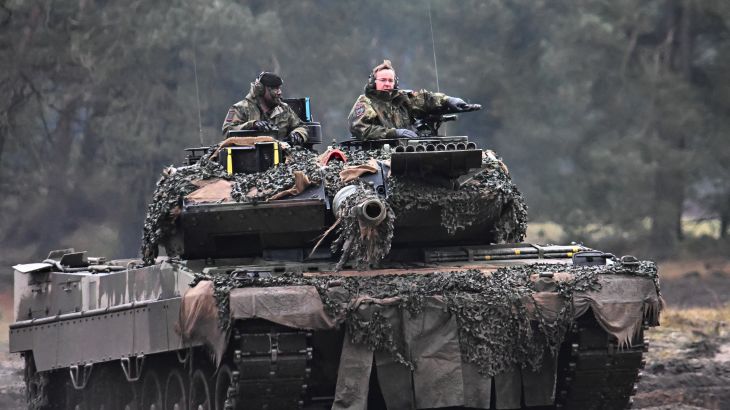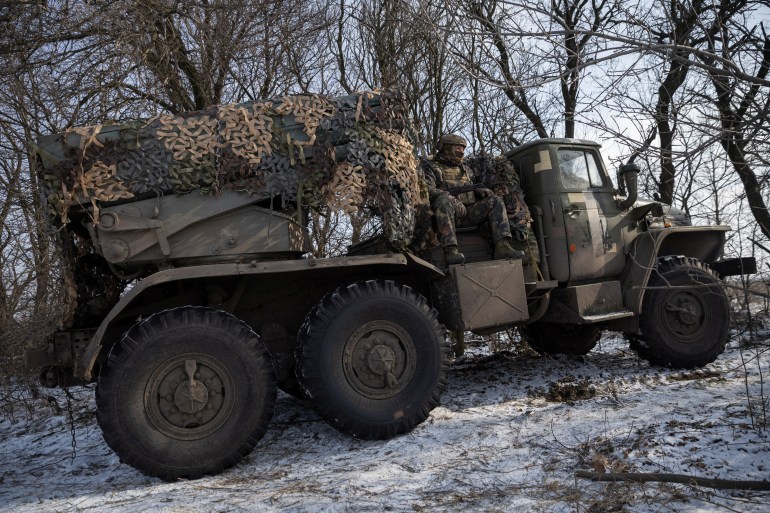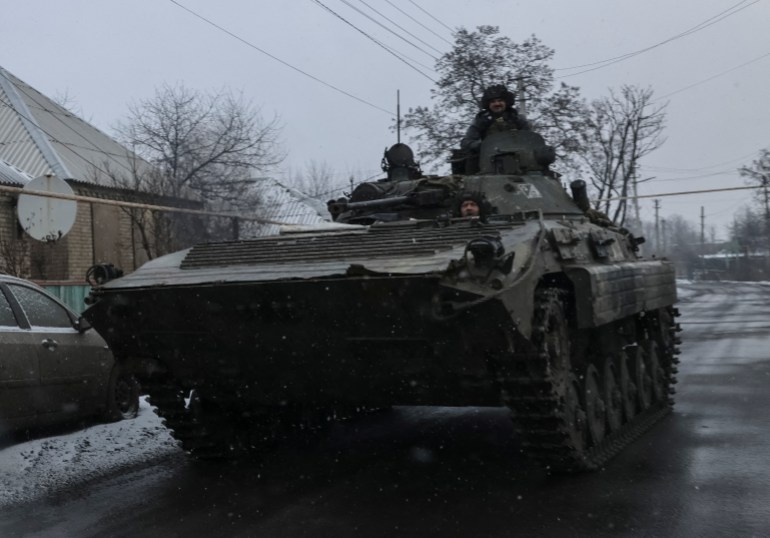European countries promise Ukraine more Leopard 1 tanks
Germany, Denmark and the Netherlands say they will provide at least 100 of the weapons for Kyiv over the coming months.

Three European countries have promised Ukraine that it will get at least 100 tanks in the “coming months” as the German defence minister made a surprise visit to Kyiv.
The German, Dutch and Danish defence ministries also said training and support would be provided for the Leopard 1 tanks, ahead of the delivery of more advanced battle tanks in the future.
Keep reading
list of 3 itemsEuropean Union bans Russian diesel, oil products over Ukraine
Russia, Ukraine swap prisoners as battle for Bakhmut rages
The pledge on Tuesday was made as Ukraine reported the deadliest 24 hours of the war so far for Russian soldiers as Moscow pressed on with an intensifying winter assault in the east, bringing tens of thousands of freshly mobilised troops onto the battlefield.
The Ukrainian military increased its running tally of Russian military dead by 1,030 overnight to 133,190. The Ukrainian claim that it was the highest number of Russians killed in one day could not be independently verified.
Russia has also claimed to have killed large numbers of Ukrainian troops in recent weeks. It said it had inflicted 6,500 Ukrainian casualties in the month of January.
The assertion that the fighting was the deadliest so far fits descriptions from both sides of an escalating campaign of close-contact trench warfare, which has left the snow-covered battlefields of eastern Ukraine littered with bodies.
Close to the town of Maryinka, 30km (18.6 miles) west of the eastern city of Donetsk, a marine unit of Ukraine’s armed forces fired rockets on Russian positions with a Soviet-era launch system.
“They storm in small infantry groups, trying to creep in farther and farther,” a soldier who gave his name only as Ievhen told the Reuters news agency. “Even without the previous artillery strikes [on Ukrainian positions], their infantry attempts to move in.”
“The enemy adapted quite well,” he said. “They learn as fast as we do. They have adopted different kinds of tactics.”
Kyiv and the West say Russia has been pouring troops and mercenaries into eastern Ukraine in recent weeks in hopes of being able to claim new gains around this month’s first anniversary of its full-scale invasion of Ukraine.

A lieutenant in the Ukrainian unit who gave his name as Volodymyr said: “The targets are given to us either by drone operators or by our spotters. They observe where our rockets explode. Then we correct our fire direction and launch again.”
The war will soon enter its second year at a pivotal juncture as Moscow tries to regain the initiative while Kyiv holds out for Western tanks to mount a counteroffensive later in 2023.
After Russia failed to capture the Ukrainian capital, Kyiv, last year and lost ground in the second half of 2022, Moscow is now making full use of hundreds of thousands of soldiers it called up in its first mobilisation since World War II.
The past few weeks have seen Russia boast of its first gains for months. But the progress has been incremental, and Moscow has yet to capture a single major population centre in its winter campaign despite thousands of dead.
Fighting has focused for months around Ukrainian-held Bakhmut in Donetsk province, a city with a pre-war population of about 75,000. Russia has made clear progress towards encircling it from both the north and south, but Kyiv said its garrison is holding fast.
Moscow has also launched an assault farther south against Vuhledar, a Ukrainian-controlled bastion also in Donetsk province on high ground at the strategic intersection between the eastern and southern front lines.
Weapons pledges
Since the New Year, Western countries have pledged hundreds of tanks and armoured vehicles to Ukraine to give it the firepower and mobility to push through Russian lines and recapture occupied territory later this year.
A new US package of weapons is expected to include longer-range rockets, which would give Ukraine the ability to hit Russian supply lines in all of the territory it occupies in Ukraine, including parts of the Crimean Peninsula.
Denmark, Germany and the Netherlands on Tuesday promised at least 100 Leopard 1 A5 tanks will be delivered “in the coming months” and said they will come from industrial stock.
The unscheduled visit to Ukraine from Germany’s new defence minister, Boris Pistorius, come two weeks after Berlin agreed to provide tanks to help Ukraine counter Russian forces following intense pressure from Kyiv and many of Berlin’s European allies.
Berlin has also promised Kyiv 14 of the newer Leopard 2 tanks.
But it will likely take months before most of the promised weapons arrive, and meanwhile, Ukraine faces a Russian force with its manpower replenished through a call-up of reservists. The Kremlin argues that Western arms supplies would only widen and extend the conflict.
“The US and its allies are trying to prolong the conflict as much as possible,” Russian Defence Minister Sergei Shoigu said on Tuesday in a conference call with military officials.
“To do this, they have started supplying heavy offensive weapons, openly urging Ukraine to seize our territories,” he said. “In fact, such steps are dragging NATO countries into the conflict and could lead to an unpredictable level of escalation.”
His use of the phrase “our territories” appeared to refer to four Ukrainian provinces Russia unilaterally annexed last year and partially occupies as well as Crimea, which it seized from Ukraine in 2014. The international community recognises all those areas as parts of Ukraine.

In a daily intelligence update, the British Ministry of Defence said Russia’s military has been trying since early January to restart major offensive operations to capture Ukraine-held parts of the Donetsk region but had gained little ground so far.
The Russians “lack munitions and manoeuvre units required for a successful offensive”, it said.
Ukrainian officials say Moscow could be accumulating weapons and reserves for an even bigger push in the coming weeks. The Ukrainian governor of Luhansk province predicted a big Russian offensive could begin there about February 15.
On the political front, the past few weeks have seen a purge of Ukrainian officials in an anti-corruption campaign, the first big shake-up of Ukraine’s government since the war began.
In his Monday evening address, Ukrainian President Volodymyr Zelenskyy said personnel changes on Ukraine’s borders and front lines would bolster its military efforts.
But he gave no indication about the fate of his defence minister, Oleksii Reznikov. The head of Zelenskyy’s party in parliament had said on Sunday that Reznikov would be replaced but said on Monday that no changes would be made this week.